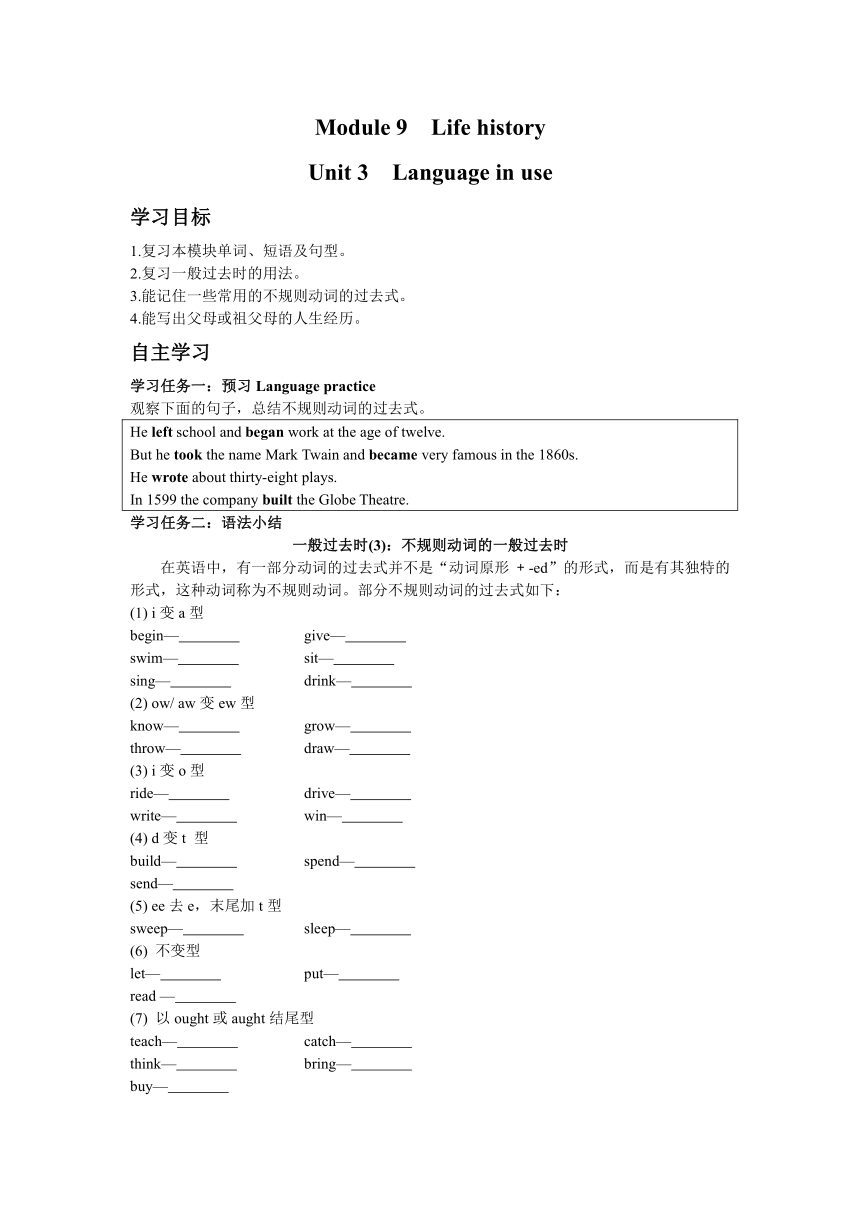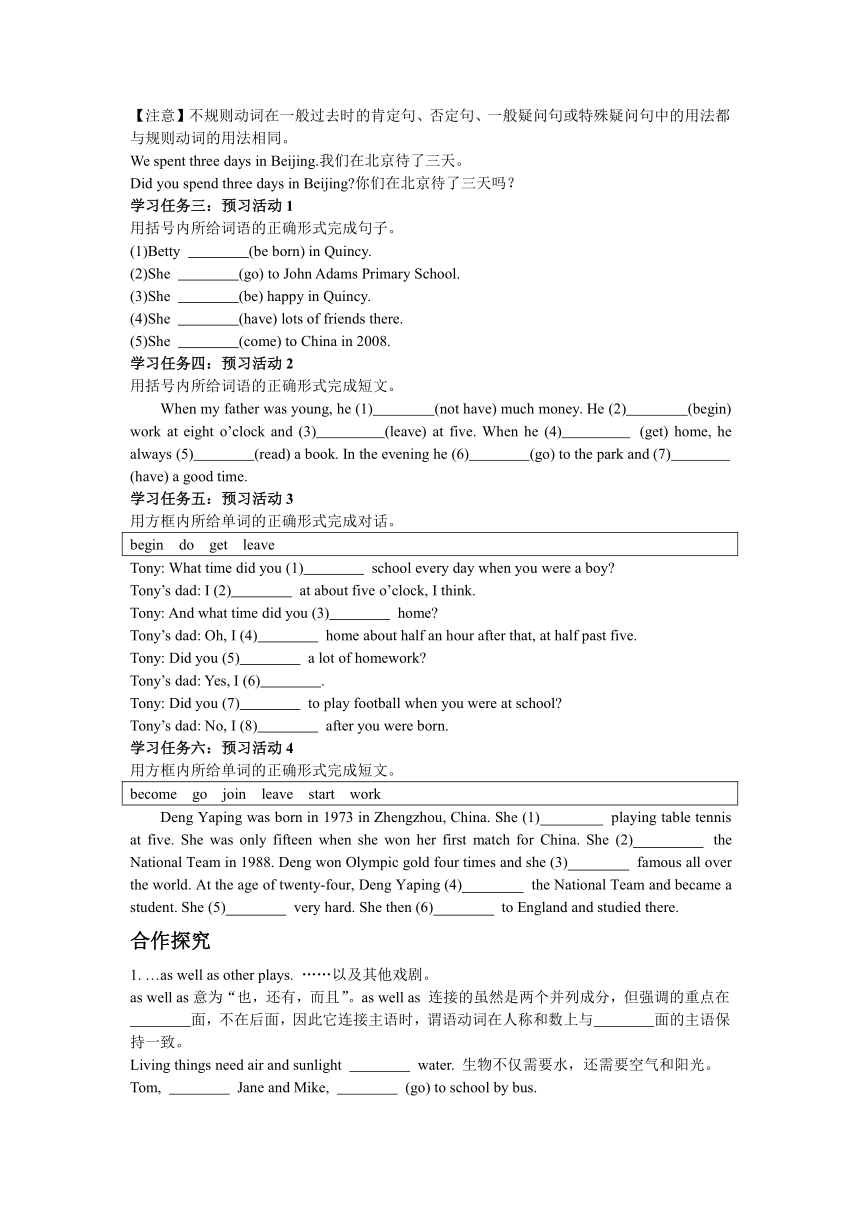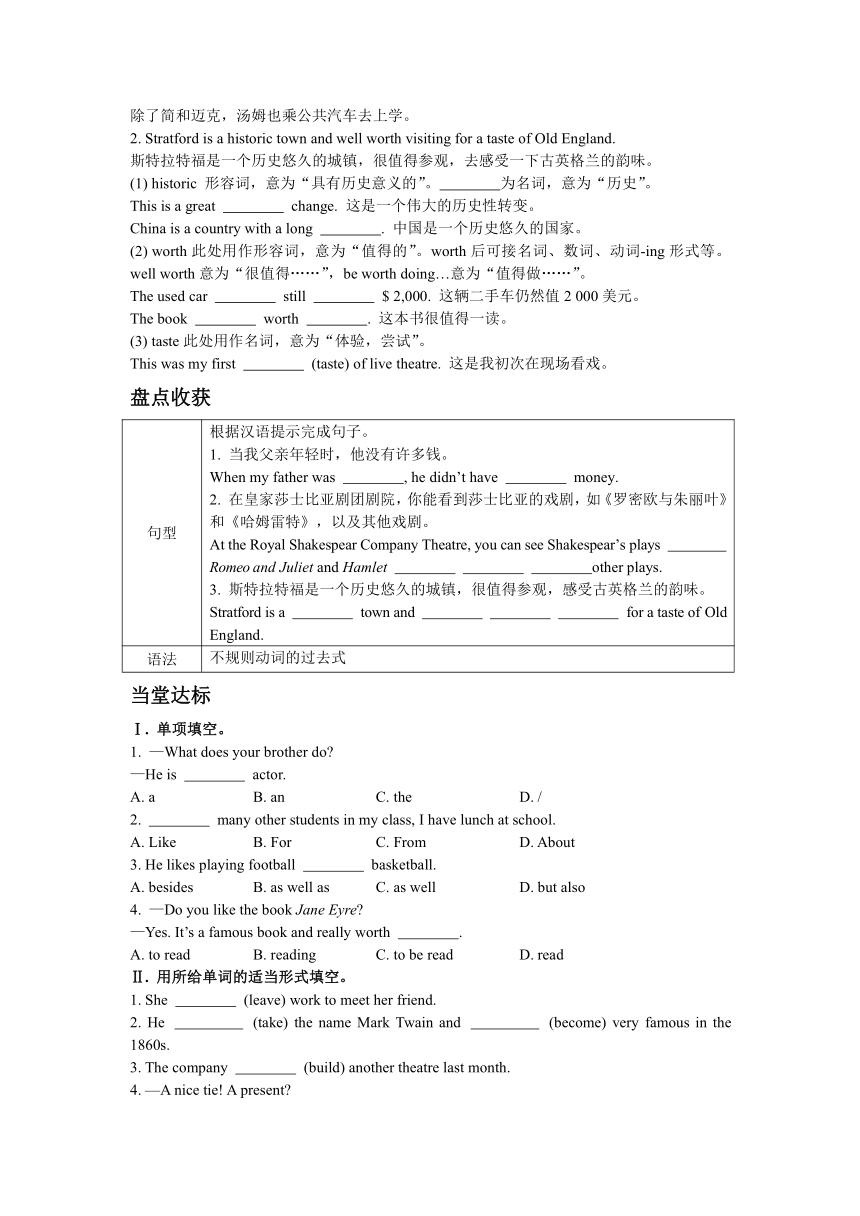Module 9 Unit 3同步学案-外语教研版中学英语七年级下
文档属性
| 名称 | Module 9 Unit 3同步学案-外语教研版中学英语七年级下 |

|
|
| 格式 | docx | ||
| 文件大小 | 34.1KB | ||
| 资源类型 | 试卷 | ||
| 版本资源 | 外研版 | ||
| 科目 | 英语 | ||
| 更新时间 | 2024-02-21 19:17:34 | ||
图片预览



文档简介
Module 9 Life history
Unit 3 Language in use
学习目标
1.复习本模块单词、短语及句型。
2.复习一般过去时的用法。
3.能记住一些常用的不规则动词的过去式。
4.能写出父母或祖父母的人生经历。
自主学习
学习任务一:预习Language practice
观察下面的句子,总结不规则动词的过去式。
He left school and began work at the age of twelve. But he took the name Mark Twain and became very famous in the 1860s. He wrote about thirty-eight plays. In 1599 the company built the Globe Theatre.
学习任务二:语法小结
一般过去时(3):不规则动词的一般过去时
在英语中,有一部分动词的过去式并不是“动词原形 + -ed”的形式,而是有其独特的形式,这种动词称为不规则动词。部分不规则动词的过去式如下:
(1) i变a型
begin— give—
swim— sit—
sing— drink—
(2) ow/ aw变ew型
know— grow—
throw— draw—
(3) i变o型
ride— drive—
write— win—
(4) d变t 型
build— spend—
send—
(5) ee去e,末尾加t型
sweep— sleep—
(6) 不变型
let— put—
read —
(7) 以ought或aught结尾型
teach— catch—
think— bring—
buy—
【注意】不规则动词在一般过去时的肯定句、否定句、一般疑问句或特殊疑问句中的用法都与规则动词的用法相同。
We spent three days in Beijing.我们在北京待了三天。
Did you spend three days in Beijing 你们在北京待了三天吗?
学习任务三:预习活动1
用括号内所给词语的正确形式完成句子。
(1)Betty (be born) in Quincy.
(2)She (go) to John Adams Primary School.
(3)She (be) happy in Quincy.
(4)She (have) lots of friends there.
(5)She (come) to China in 2008.
学习任务四:预习活动2
用括号内所给词语的正确形式完成短文。
When my father was young, he (1) (not have) much money. He (2) (begin) work at eight o’clock and (3) (leave) at five. When he (4) (get) home, he always (5) (read) a book. In the evening he (6) (go) to the park and (7)
(have) a good time.
学习任务五:预习活动3
用方框内所给单词的正确形式完成对话。
begin do get leave
Tony: What time did you (1) school every day when you were a boy
Tony’s dad: I (2) at about five o’clock, I think.
Tony: And what time did you (3) home
Tony’s dad: Oh, I (4) home about half an hour after that, at half past five.
Tony: Did you (5) a lot of homework
Tony’s dad: Yes, I (6) .
Tony: Did you (7) to play football when you were at school
Tony’s dad: No, I (8) after you were born.
学习任务六:预习活动4
用方框内所给单词的正确形式完成短文。
become go join leave start work
Deng Yaping was born in 1973 in Zhengzhou, China. She (1) playing table tennis at five. She was only fifteen when she won her first match for China. She (2) the National Team in 1988. Deng won Olympic gold four times and she (3) famous all over the world. At the age of twenty-four, Deng Yaping (4) the National Team and became a student. She (5) very hard. She then (6) to England and studied there.
合作探究
1. …as well as other plays. ……以及其他戏剧。
as well as意为“也,还有,而且”。as well as 连接的虽然是两个并列成分,但强调的重点在
面,不在后面,因此它连接主语时,谓语动词在人称和数上与 面的主语保持一致。
Living things need air and sunlight water. 生物不仅需要水,还需要空气和阳光。
Tom, Jane and Mike, (go) to school by bus.
除了简和迈克,汤姆也乘公共汽车去上学。
2. Stratford is a historic town and well worth visiting for a taste of Old England.
斯特拉特福是一个历史悠久的城镇,很值得参观,去感受一下古英格兰的韵味。
(1) historic 形容词,意为“具有历史意义的”。 为名词,意为“历史”。
This is a great change. 这是一个伟大的历史性转变。
China is a country with a long . 中国是一个历史悠久的国家。
(2) worth此处用作形容词,意为“值得的”。worth后可接名词、数词、动词-ing形式等。well worth意为“很值得……”,be worth doing…意为“值得做……”。
The used car still $ 2,000. 这辆二手车仍然值2 000美元。
The book worth . 这本书很值得一读。
(3) taste此处用作名词,意为“体验,尝试”。
This was my first (taste) of live theatre. 这是我初次在现场看戏。
盘点收获
句型 根据汉语提示完成句子。 1. 当我父亲年轻时,他没有许多钱。 When my father was , he didn’t have money. 2. 在皇家莎士比亚剧团剧院,你能看到莎士比亚的戏剧,如《罗密欧与朱丽叶》和《哈姆雷特》,以及其他戏剧。 At the Royal Shakespear Company Theatre, you can see Shakespear’s plays Romeo and Juliet and Hamlet other plays. 3. 斯特拉特福是一个历史悠久的城镇,很值得参观,感受古英格兰的韵味。 Stratford is a town and for a taste of Old England.
语法 不规则动词的过去式
当堂达标
Ⅰ. 单项填空。
1. —What does your brother do
—He is actor.
A. a B. an C. the D. /
2. many other students in my class, I have lunch at school.
A. Like B. For C. From D. About
3. He likes playing football basketball.
A. besides B. as well as C. as well D. but also
4. —Do you like the book Jane Eyre
—Yes. It’s a famous book and really worth .
A. to read B. reading C. to be read D. read
Ⅱ. 用所给单词的适当形式填空。
1. She (leave) work to meet her friend.
2. He (take) the name Mark Twain and (become) very famous in the 1860s.
3. The company (build) another theatre last month.
4. —A nice tie! A present
—Yes, it is. My aunt (send) it to me for my last birthday.
5. The teacher is already standing here. Do you know when she (come)
Ⅲ. 句型转换(每空一词)。
1. Kevin went to the zoo yesterday. (改为否定句)
Kevin to the zoo yesterday.
2. Lily and Lucy came to China last month. (改为一般疑问句,并作肯定回答和否定回答)
— Lily and Lucy to China last month
—Yes, ./ No, .
3. Cindy did her homework last night. (对画线部分提问)
Cindy last night
4. The workers built the house last year. (对画线部分提问)
the workers the house
5. Mary taught history in No. 102 Middle School in 2018. (对画线部分提问)
Mary history in 2018
Ⅳ. 阅读理解。
Do you know Helen Keller She was a famous person in the world. And she was born in 1880 in America. When she was young, she had a high fever (发高烧). Then she became deaf and blind. She couldn’t hear or see. It was difficult for her to understand other people.
In 1887, Anne Sullivan came to help Helen. Helen was a clever girl. She learnt to read and write with the help of Anne. In 1900, she entered a university. Anne went to school with her.
Anne listened to the professors’ words, and then wrote their words onto Helen’s hand.
After Helen finished university, she visited many countries. She talked about her life. She was famous all over the world for her courage (勇气) and hard work. She did her best to help people who were deaf or blind. She died at the age of 88.
1. How old was Helen Keller when Anne Sullivan came to help her
A. 10. B. 7. C. 5. D. 2.
2. How do you like Helen Keller
A. She’s clever. B. She’s brave.
C. She’s hard-working. D. All of the above.
3. Why did Anne Sullivan go to school with Helen Keller
A. Because Anne Sullivan was a strict teacher.
B. Because Helen was always tired.
C. Because the lessons were always boring.
D. Because Helen wanted Anne Sullivan to help her to listen.
4. When did Helen Keller die
A. In 1958. B. In 1968. C. In 1976. D. In 1986.
5. Which of the following is TRUE
A. Anne was Helen’s doctor.
B. Helen did her best to help people who were deaf or blind.
C. Helen couldn’t hear or see when she was born.
D. Helen finished university in 1900.
学后反思
当堂达标参考答案:
Ⅰ. 1. B 2. A
3. B as well as意为“也;还有;而且”,连接两个并列的成分。
4. B be worth doing…意为“值得做……”。
Ⅱ. 1. left 2. took; became 3. built 4. sent 5. came
Ⅲ. 1. didn’t go 2. Did; come; they did; they didn’t 3. What did; do 4. When did; build
5. Where did; teach
Ⅳ. 语篇解读:本文介绍的是海伦·凯勒的故事。她幼年时,因发高烧而丧失了听觉和视觉。在老师的帮助下,她学会了读书和写字并考上了大学。她因其勇气和努力而闻名全世界。
1. B 根据第一段中她出生于1880年,以及第二段中安妮·莎莉文来帮助她是在1887年可推知,那时海伦·凯勒7岁。
2. D 通读全文可知海伦·凯勒是一个聪明、勇敢而且非常努力的人,所以选D。
3. D 因为海伦·凯勒听不见且看不见,所以她需要借助安妮·莎莉文的帮助来“听”老师讲的内容。
4. B 根据短文第一段中她出生于1880年,最后一段中她去世时88岁可知,海伦·凯勒于1968年去世。
5. B 由第二段可知安妮是海伦·凯勒的老师;由第一段可知海伦·凯勒是在幼年时因生病而丧失听觉和视觉;由第二段可知海伦·凯勒在1900年开始上大学。由最后一段可知选项B的描述是正确的。
Unit 3 Language in use
学习目标
1.复习本模块单词、短语及句型。
2.复习一般过去时的用法。
3.能记住一些常用的不规则动词的过去式。
4.能写出父母或祖父母的人生经历。
自主学习
学习任务一:预习Language practice
观察下面的句子,总结不规则动词的过去式。
He left school and began work at the age of twelve. But he took the name Mark Twain and became very famous in the 1860s. He wrote about thirty-eight plays. In 1599 the company built the Globe Theatre.
学习任务二:语法小结
一般过去时(3):不规则动词的一般过去时
在英语中,有一部分动词的过去式并不是“动词原形 + -ed”的形式,而是有其独特的形式,这种动词称为不规则动词。部分不规则动词的过去式如下:
(1) i变a型
begin— give—
swim— sit—
sing— drink—
(2) ow/ aw变ew型
know— grow—
throw— draw—
(3) i变o型
ride— drive—
write— win—
(4) d变t 型
build— spend—
send—
(5) ee去e,末尾加t型
sweep— sleep—
(6) 不变型
let— put—
read —
(7) 以ought或aught结尾型
teach— catch—
think— bring—
buy—
【注意】不规则动词在一般过去时的肯定句、否定句、一般疑问句或特殊疑问句中的用法都与规则动词的用法相同。
We spent three days in Beijing.我们在北京待了三天。
Did you spend three days in Beijing 你们在北京待了三天吗?
学习任务三:预习活动1
用括号内所给词语的正确形式完成句子。
(1)Betty (be born) in Quincy.
(2)She (go) to John Adams Primary School.
(3)She (be) happy in Quincy.
(4)She (have) lots of friends there.
(5)She (come) to China in 2008.
学习任务四:预习活动2
用括号内所给词语的正确形式完成短文。
When my father was young, he (1) (not have) much money. He (2) (begin) work at eight o’clock and (3) (leave) at five. When he (4) (get) home, he always (5) (read) a book. In the evening he (6) (go) to the park and (7)
(have) a good time.
学习任务五:预习活动3
用方框内所给单词的正确形式完成对话。
begin do get leave
Tony: What time did you (1) school every day when you were a boy
Tony’s dad: I (2) at about five o’clock, I think.
Tony: And what time did you (3) home
Tony’s dad: Oh, I (4) home about half an hour after that, at half past five.
Tony: Did you (5) a lot of homework
Tony’s dad: Yes, I (6) .
Tony: Did you (7) to play football when you were at school
Tony’s dad: No, I (8) after you were born.
学习任务六:预习活动4
用方框内所给单词的正确形式完成短文。
become go join leave start work
Deng Yaping was born in 1973 in Zhengzhou, China. She (1) playing table tennis at five. She was only fifteen when she won her first match for China. She (2) the National Team in 1988. Deng won Olympic gold four times and she (3) famous all over the world. At the age of twenty-four, Deng Yaping (4) the National Team and became a student. She (5) very hard. She then (6) to England and studied there.
合作探究
1. …as well as other plays. ……以及其他戏剧。
as well as意为“也,还有,而且”。as well as 连接的虽然是两个并列成分,但强调的重点在
面,不在后面,因此它连接主语时,谓语动词在人称和数上与 面的主语保持一致。
Living things need air and sunlight water. 生物不仅需要水,还需要空气和阳光。
Tom, Jane and Mike, (go) to school by bus.
除了简和迈克,汤姆也乘公共汽车去上学。
2. Stratford is a historic town and well worth visiting for a taste of Old England.
斯特拉特福是一个历史悠久的城镇,很值得参观,去感受一下古英格兰的韵味。
(1) historic 形容词,意为“具有历史意义的”。 为名词,意为“历史”。
This is a great change. 这是一个伟大的历史性转变。
China is a country with a long . 中国是一个历史悠久的国家。
(2) worth此处用作形容词,意为“值得的”。worth后可接名词、数词、动词-ing形式等。well worth意为“很值得……”,be worth doing…意为“值得做……”。
The used car still $ 2,000. 这辆二手车仍然值2 000美元。
The book worth . 这本书很值得一读。
(3) taste此处用作名词,意为“体验,尝试”。
This was my first (taste) of live theatre. 这是我初次在现场看戏。
盘点收获
句型 根据汉语提示完成句子。 1. 当我父亲年轻时,他没有许多钱。 When my father was , he didn’t have money. 2. 在皇家莎士比亚剧团剧院,你能看到莎士比亚的戏剧,如《罗密欧与朱丽叶》和《哈姆雷特》,以及其他戏剧。 At the Royal Shakespear Company Theatre, you can see Shakespear’s plays Romeo and Juliet and Hamlet other plays. 3. 斯特拉特福是一个历史悠久的城镇,很值得参观,感受古英格兰的韵味。 Stratford is a town and for a taste of Old England.
语法 不规则动词的过去式
当堂达标
Ⅰ. 单项填空。
1. —What does your brother do
—He is actor.
A. a B. an C. the D. /
2. many other students in my class, I have lunch at school.
A. Like B. For C. From D. About
3. He likes playing football basketball.
A. besides B. as well as C. as well D. but also
4. —Do you like the book Jane Eyre
—Yes. It’s a famous book and really worth .
A. to read B. reading C. to be read D. read
Ⅱ. 用所给单词的适当形式填空。
1. She (leave) work to meet her friend.
2. He (take) the name Mark Twain and (become) very famous in the 1860s.
3. The company (build) another theatre last month.
4. —A nice tie! A present
—Yes, it is. My aunt (send) it to me for my last birthday.
5. The teacher is already standing here. Do you know when she (come)
Ⅲ. 句型转换(每空一词)。
1. Kevin went to the zoo yesterday. (改为否定句)
Kevin to the zoo yesterday.
2. Lily and Lucy came to China last month. (改为一般疑问句,并作肯定回答和否定回答)
— Lily and Lucy to China last month
—Yes, ./ No, .
3. Cindy did her homework last night. (对画线部分提问)
Cindy last night
4. The workers built the house last year. (对画线部分提问)
the workers the house
5. Mary taught history in No. 102 Middle School in 2018. (对画线部分提问)
Mary history in 2018
Ⅳ. 阅读理解。
Do you know Helen Keller She was a famous person in the world. And she was born in 1880 in America. When she was young, she had a high fever (发高烧). Then she became deaf and blind. She couldn’t hear or see. It was difficult for her to understand other people.
In 1887, Anne Sullivan came to help Helen. Helen was a clever girl. She learnt to read and write with the help of Anne. In 1900, she entered a university. Anne went to school with her.
Anne listened to the professors’ words, and then wrote their words onto Helen’s hand.
After Helen finished university, she visited many countries. She talked about her life. She was famous all over the world for her courage (勇气) and hard work. She did her best to help people who were deaf or blind. She died at the age of 88.
1. How old was Helen Keller when Anne Sullivan came to help her
A. 10. B. 7. C. 5. D. 2.
2. How do you like Helen Keller
A. She’s clever. B. She’s brave.
C. She’s hard-working. D. All of the above.
3. Why did Anne Sullivan go to school with Helen Keller
A. Because Anne Sullivan was a strict teacher.
B. Because Helen was always tired.
C. Because the lessons were always boring.
D. Because Helen wanted Anne Sullivan to help her to listen.
4. When did Helen Keller die
A. In 1958. B. In 1968. C. In 1976. D. In 1986.
5. Which of the following is TRUE
A. Anne was Helen’s doctor.
B. Helen did her best to help people who were deaf or blind.
C. Helen couldn’t hear or see when she was born.
D. Helen finished university in 1900.
学后反思
当堂达标参考答案:
Ⅰ. 1. B 2. A
3. B as well as意为“也;还有;而且”,连接两个并列的成分。
4. B be worth doing…意为“值得做……”。
Ⅱ. 1. left 2. took; became 3. built 4. sent 5. came
Ⅲ. 1. didn’t go 2. Did; come; they did; they didn’t 3. What did; do 4. When did; build
5. Where did; teach
Ⅳ. 语篇解读:本文介绍的是海伦·凯勒的故事。她幼年时,因发高烧而丧失了听觉和视觉。在老师的帮助下,她学会了读书和写字并考上了大学。她因其勇气和努力而闻名全世界。
1. B 根据第一段中她出生于1880年,以及第二段中安妮·莎莉文来帮助她是在1887年可推知,那时海伦·凯勒7岁。
2. D 通读全文可知海伦·凯勒是一个聪明、勇敢而且非常努力的人,所以选D。
3. D 因为海伦·凯勒听不见且看不见,所以她需要借助安妮·莎莉文的帮助来“听”老师讲的内容。
4. B 根据短文第一段中她出生于1880年,最后一段中她去世时88岁可知,海伦·凯勒于1968年去世。
5. B 由第二段可知安妮是海伦·凯勒的老师;由第一段可知海伦·凯勒是在幼年时因生病而丧失听觉和视觉;由第二段可知海伦·凯勒在1900年开始上大学。由最后一段可知选项B的描述是正确的。
同课章节目录
- Module 1 Lost and found
- Unit 1 Whose bag is this?
- Unit 2 Are they yours?
- Unit 3 Language in use
- Module 2 What can you do ?
- Unit 1 I can play the piano
- Unit 2 I can run really fast
- Unit 3 Language in use
- Module 3 Making plans
- Unit 1 What are you going to do at the weekends?
- Unit 2 We're going to cheer the players.
- Unit 3 Language in use
- Module 4 Life in the future
- Unit 1 Everyone will study at home
- Unit 2 Every family will have a small plane.
- Unit 3 Language in use
- Module 5 Shopping
- Unit 1 What can I do for you?
- Unit 2 You can buy everything on the Internet
- Unit 3 Language in use
- Module 6 Around town
- Unit 1 Could you tell me how to get to the Nationa
- Unit 2 The London Eye is on your right.
- Unit 3 Language in use
- Revision module A
- Module 7 My past life
- Unit 1 I was born in a small village.
- Unit 2 I was born in Quincy.
- Unit 3 Language in use
- Module 8 Story time
- Unit 1 Once upon a time….
- Unit 2 Goldilocks hurried out of the house.
- Unit 3 Language in use
- Module 9 Life history
- Unit 1 He left school and began work at the age of
- Unit 2 He decided to be an actor.
- Unit 3 Language in use
- Module 10 A holiday journey
- Unit 1 What did you do?
- Unit 2 This morning we took a walk.
- Unit 3 Language in use
- Module 11 Body language
- Unit 1 They touch noses!
- Unit 2 Here are some ways to welcome them.
- Unit 3 Language in use
- Module 12 Western music
- Unit 1 It's so beautiful!
- Unit 2 Vienna is the centre of European classical
- Unit 3 Language in use
- Revision module B
